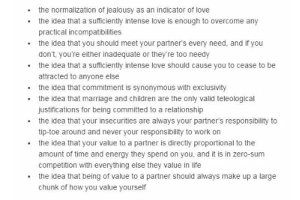



And they lived happily ever before
 1.0.12
1.0.12 
On love of two subjects
Switching the programs
Once a gay pup accepts his sexuality, manages coming out to those he trusts, enters all the consumer facilities that the community offers, he seems to have two choices. To join the camp of "the decent ones" - building a relationship, or "the sluts" – indulging in uninhibited sex. The choice seems to be a matter of negotiation between internal sexual and external social pressure.
The notion of sex as a physical expression of emotional love sounds almost inappropriately romantic. The sex folk does not want to be bothered with unnecessary relationship "drama", "commitments" – because that’s what love equals, right? The relationship crowd often considers body and sex as less important, secondary to feelings, so intimate it gets often performed under the switched-off light, a dangerous source of diseases that needs to be confined into monogamous exclusivity.
What these two groups have in common is the "male approach". They execute, they do. Despite rising popularity of gender studies, concept of queerness, "everyone is an individuality" … whether due to nature or nurture, prevalent gender expressions are still quite distinct. Men sport more aggression, higher proportion of those who prefer things over humans, technical inclinations. Men prefer following assembly handbooks, clear instructions, doing to feeling, rational explanations, briefness, "make it simple", editing out of unnecessary chatter. They feel more at home in action than communication. Majority of the app profiles confirm this trait in gay men too.
Sex robots execute sex according to handbook, as a series of instructions of computer code – how it is supposed to be done, how it is usually done, how everyone does it. How they do it in porn. Exchange of important data (age, height, weight, size, position), no tedious extra words, straight to the point. Let’s "do it". Simple categories: are you top/bottom/versatile - in what way can I have you? The body of their partner is being used and consumed. We are "having partners" (trophy), "having sex" (execution of the claim). The sex is enacted in its mechanical dimension, feelings are unnecessary complications to the so-called "fun". There is performance involved, evaluation and associated anxiety. Think of Olympics, sports, competition. Numerical data (size of cock, duration, repetitions) matters over the quality.
Relationship robots execute relationships according to handbook, as a series of instructions of computer code – how it is supposed to be done, how it is usually done, how everyone does it. How they do it in movies. First date, first kiss, first sex, buying a house, moving in, mortgage, party for friends. Routine dinners, routine morning kiss, routine sex. Despite relationships being the domain of love (unlike sex), often there is no love involved. They are just mechanically enacted. So many rules to follow – when you are in relationship you cannot, when you are in relationship you have to. The only drama in the routine is infidelity, betrayal, deception. Rough terms, inadequate categories for intimate interaction with another human being. Jealousy actually reveals the essence of many relationship – more than breaching of the assumed contract: I own you, I lose you. We are not only "having relationship", we are "having him". The ultimate measurement of relationships comes in duration. "How long have you been together? Ten years. Beautiful. Twenty years. Amazing. All life. Marvelous." The artificial awe favors numerical data over the quality and content.
Real life sex and porn relate – often it is hard to tell which one tries clumsily to imitate the other one. Both work with a handed-over fantasy of idealized male world, where obstacle of "too much conversation to be executed" is removed, no candles or roses, no "bullshit" talking, just horny macho(s) walking the streets and picking their buddies in three-word exchanges. Straight man’s dream enacted by gay men – just among each other – because they share the same nature. Of course, the "male" refers to the contemporary notion of it, copied and supported within wolf-pack dynamics. Men aim to achieve realization of their fantasy, at least in partial wins, rather than question the fantasy and their notion of maleness as a whole.
Likewise, the relationship handbook comes from zillions of movies and series and novels, that mindlessly copy the phrases, romantic and dramatic cliches - otherwise it might be necessary to think about a need of "filling up" something empty in its essence. Two men locked in a room, forced to talk to each other? Expected to experience every bit of free time, amusement, socialization together? This triggers a fantasy of hero that must perform, rather than a safe haven to relax into one’s vulnerability.
Love and sex in the grey zone
What strikes is the missing space in between, which ironically - according to some theories – is supposed to be native to the queer folks. Sex-versus-relationship binary dilemma just copies the hetero/homo and male/female dichotomies. Bisexuality, intersexuality and polyamory – all grey-zone concepts irritate. "You can’t have it all, you have to choose!" In between "heartless sex" and "sugary relationship", the space in between could mean: What about offering a trust and love to a random one-night-stand partner? What about considering all the casual quickies as relationships in their own truth, where the partner is physically but also emotionally touched? Quality of interaction matters, not the duration. In 5 minutes one can exchange more than married couple does in 5 years. It’s a question of what all involved give into it, not what category of contact it is and how should it be enacted in correct way.
Imagine meeting a guy. You feel the attraction. Belly butterflies, rapture, a focus. A beautiful and not-everyday moment. Watch the habits. What is your pattern of coping with the presence of beauty? You want to fuck him or masturbate over him or marry him … or "have him" in other ways? Now stop and try to see him as a person, who does not need to be consumed or owned. Try to love yourself – not as a looser who needs to grab the opportunity before someone more worthy snatches it (him). You and him, two free beings, meet here and now. What other ways to enjoy each other’s presence are there?
What if you meet a person, that you like, now, but would not like to meet him again, or live with him? Should you restrain yourself … or rather express the current attraction, in its genuine extent - and give him at least that little love you can? Should we avoid interactions with lovers if we do not wish to offer the "whole package"? Do you love to receive incomplete compliments – smiles, kind words, hugs? Does it lift your self-confidence, if people let you know that you are sexy and attractive, without necessarily needing to push it further?
Imagine you and him are available and accessible for intimate encounter. You don’t need to enter or be entered. Please or be pleased. There’s a beautiful guy next to you. Without having to do anything, without having to perform, without time ticking – in what way you would wish to discover him? Watch him in his beauty in indulgent way, as if no clock was ticking? Explore combinations of different body parts touching other body parts? Sniff him and taste him in various places? I bet a popularity of dozens of fetishes has something to say about how rare and therefore teasing the sensual experience in gay sex is.
Once you have him nude, do you have to start playing with his genitals? Do you have to stimulate him with more and more intensity. If you start kissing, can you stop kissing – without fear of being interpreted as losing interest? Whatever activity happens, does it need to be followed by something else from the usual set, does it need to escalate, is the orgasm (or just ejaculation) compulsory? Do you prefer being horny and play endlessly, or the feeling "after it ends"? How much liberty in taking the experience of sex in your momentarily preferred direction do you really have?
Usual replacement word for NSA sex is "fun", often with diminutives as "just" or "a bit". How much fun did you really notice in your past quickies? Practical "release" is often hasty – and as such a focus is put on performing it efficiently and perfectly. What about the failure stress? Wasn’t sex the last domain not subdued by norms and standards, that last institution where a human being can go full-blood human, liberated, joyful, "nude"? How much playfulness, creativity, curiosity is one allowed to profess in sexual encounters? Casual sex does not need to be average. Quickie does not have to be heartless. One-night stand does not need to happen in armor of emotional detachment.
It happened. It was done. It was accomplished. Is the relationship or abrupt end the only two possibilities you have? Can you switch between romantic and sensual character of the encounter? Can you discover the person more or in different way? Is the switching of the modes of engagement allowed? Do you feel odd asking him about it? How easy is to suggest it? Can you fall in love just a bit, in this moment - and allow yourself to feel a bit of pain (of impossibility, inconclusiveness, brevity) too? Can you widen your notion of love from being just a matter of light, happiness, being there, satisfaction, longevity – and include incompleteness, frustration, sadness?
Just a bit of love in loving
If sex can be imagined in a more humanized way, can the relationships be as well? Not only men, but humans in general are used to handbooks and holy books. Performing correctly. Being approved and as such included and loved. Primeval fear of expulsion from the tribe seems persisting, despite the popularity of traveling, mixing up, running far away from home. Humans learn not only by trying, but often by copying. Relationship models that we have are result of thousands of years of research, cul-de-sacs and proven ways. The choice appears to be a matter of more conservative or liberal taste.
Straight people can always excuse their arbitrary norms with setting up a safe and sufficient nest for raising their offsprings. Something that usually works. Where machismo flourishes, male honor is invented – I’ll feed and favor only my son, my blood - patrilineal societies address the issue of infanticide with strict faithfulness norms, dividing family units by elder males. Infidelity becomes taboo – in mutual contract – men will not feed other men’s children, women will not fear losing help with a child that male has so easily conceived. Of course, there are also matrilineal examples in humans and animals – where all the mother’s children are hers, status and sense of belonging is being passed from her, male originators are not that important. These societies seem to be less stressed, more harmonious, peaceful and joyful.
Now, what does oblige gay people to imitate straight relationships in all the details? Do we need to prove that we are good enough? Is that the measure of worthiness? Are straight families the right judges? Do we want to be accepted because we are "like everyone else", or because we are okay as our unique and distinct selves? Where can be the "ok" drawn from, aside of fitting in, complying with the contemporary fashion, conforming to the local norm? What if we stop begging for being allowed to marry in the same way as straight peers can and instead propose our own concepts of unions, relationships, rules, institutions, norms? Using the words and rules that "everybody knows" (marriage, husband, wedding, rings, families, fidelity) gives us speedy lift to the same status ... but do we want to be there in the first place? Using new words and new concepts may feel artificial, inferior, sneered upon, catching up much slower … but head more in our own direction.
If you imagine just for a moment, that you don’t want to copy any concepts that society holds dear, but you invent them right here, right now, to fit you own needs and knowledge – what would it look like? Too many options? All these flavors of open relationships, polyamory, relationship anarchy – no fixed point in the universe. No right ways. No failures. Just trying our best. Creating.
If that feels too much to handle in the beginning, how can we adjust what we already know to our nature. What is our nature in the first place? Are we just binary combinations – men who are attracted by men, women who fancy women? Queerness was and is interpreted in many ways. One of the less usual examples is ancient two-spirit role in Native American tribes [1] [2] [3] [4], once appreciated, needed and revered. The third and fourth gender was expected to provide specific service to the society – that rooted in their nature of in-between-ers: as the mediators, history and tradition preservers, rite organizers, masters of ceremonies, caretakers. They bonded intimately (tightly and loosely) with straight men, not amongst each other. This just shows that strict coupling amongst our same gay kind, working and consuming as the rest of the swarm - is not the only way to exist.
Playing monopoly
From life-long monogamy, serial monogamy, open relationships towards polyamory, there is a spectrum of arrangements. Though they do not need to be predefined and fixed. Again, one does not need to choose and stick to his choice all the life. To fight for his camp. A man meets a man. They fall in love, enjoy initial intensity, explore each-other sensually, sexually, emotionally – and there’s barely a space for anything else. They don’t need anyone else. Inevitably, all this becomes way too familiar, ordinary, eventually even dull. They can follow the advice of zillions of magazines that offer "10 ways how to make the relationship last" – but the durability is just an artificial program.
Why should one prolong something that makes no sense anymore, gives no joy? Just because the laws of society are made to suit the eternal couples? Living things change – and eventually die. The relationships transform and eventually burn out. Holding them on respiratory machines feels a bit like Frankenstein project. Why? Because it is "nice"? Because it is "romantic"? Because "everyone does it"? Because life is light is good, and death is darkness is bad? The ends are not wrong, the ends just make space for new beginning, new life, new stories, new knowledge, new perspective. Letting go seems not a skill that we are so well taught, as holding onto (loyalty).
It can’t be denied that intimacy with a person that one knows for a long time feels different. One does not need to show-off, perform, can allow himself to be tired, fall asleep, fail to stay hard, have no mood, be more cuddly than passionate. Especially for men, who compete amongst each-other and who evaluate even their own performance, the ability to relax from "doing" and just "be" can be an attractive offer. However, this familiarity, routine, less fervor – can be boring. The random lover or even long-term secretive love affair – can provide new stimuli, excitement, reviving on more than sexual level. The adventurous interaction can be more daring, experimental, engaged, with an extra taste of forbidden fruit. This contrast seems to be the core of most of the infidelity affairs and eventually breakups.
Although, it’s just a human nature that we stand in between contrasting needs. We like the stability and we like the surprise. We like the relaxation and we like the excitement. We like trust and understanding, but we like also passion and transgressing. Choosing between rightful constituent parts of our humanity is such an absurd idea. Who else than natural born in-between-ers could have more insight and resonance with this perspective? The notion that stability and adventure cannot coexist is just artificial concept, a matter of cultural tradition that we have learned from the crowd (gays are born into straight families and theirs are the singular examples that we grow with), something we seek so desperately that we forget to ask why we seek it at all.
So I live with a man for ten years, we wear each other’s socks, then someone else comes in the way. The usual code of conduct is to suppress the attraction. We force ourselves to believe that a person has a capacity to love (be attracted to) just one person. We remove the person from our sight, reduce the chances of being teased. Otherwise we "slip". What if I acknowledge the attraction to the new lover and still acknowledge and appreciate the other connection I have with my stable partner? That story of the first relationship has happened and can’t unhappen. Being rooted in the stability that is not shaken by sudden arrival of someone else can reveal itself in relaxed attitude (as opposite to frustration) in the contact with new lover. On the other hand, the exciting new things that I learn with him can revive and enrich also the older stable relationship that I already have. Each side wins.
Imagine there’s multitude of these interactions, happening simultaneously, though starting, transforming and ending in their own due time. Each one on a different level, with a different flavor. Some are more intense sexually, some more emotionally, some are equal. Some happen just once and give us what they are meant to give us, what they can give us, but some repeat. Some are short term, some last longer, some last quite long. It’s not a tragedy, but a natural development if one of them gets sidetracked, loses drive, becomes more detached while some others intensify. Instead of resisting, we can accept the flow of changes. They are not evil, they are, they happen.
An artificial concept that a relationship hast to last long (if not till death) and be with one individual exclusively - creates an artificial demand that our partner has to cover all our needs. Does he? Is it his purpose in this life to satisfy all our needs? Is it his single aspiration to be a perfect match – for me? Or "is it about compromise" as popular saying goes? Are we supposed to learn to be satisfied with what we get ("you can’t have it all" again), choosing something as more important than something else? Which one is more important above all our needs? Why should we rank our needs at all? Isn’t me exactly the acknowledgment of myself in all my complexity? There’s a bad habit of equalizing honesty with fidelity. Being genuine does not mean to be loyal (sticking) to one person (one side), but acknowledging honestly what everything I am, what everything I need, whom everyone I love. Say it honestly, without shame, without fear.
In multiplied relationship we know exactly why we are with each partner, why in that particular form of connection. Each partner and lover can cover a different need. One I can stand sharing the home with, but sex is not that interesting. Another one is great lover, but I can’t imagine having to live with him. Another one is willing to try more kinky sex, but romance does not work with him. Still, this was quite a simplified example. At the end, we don’t have to explain and diminish "sidekicks" just as "what was necessary to make our primary relationship last". They are true, valuable and self-sufficient in their own right.
Perhaps, one needs to relax from the usual male wiring: The lover and the others. Friends and foes. Seeing everyone else as competitors that challenge our claim for a partner of our own. What if they all are lovers? What if they don’t want to take something from us, but all bring something in? What if there is no narrow home and then the rest a danger zone – but home can expand and be a bit fuzzy in definition?
A popular phrase says "he is jealous, he must love me". Perhaps those people have not experienced love in their life yet. Love does not manipulate, extort, confine. Love enriches, grants, allows, opens, expands. Deriving love from exclusive ownership reveals just one thing – exclusive ownership. One of the usual objections against polyamory, sexual adventurousness or free love says that wanting everything is selfish. Voluntary modesty is associated with decent behavior, fairness, generosity. Though, if we look at the other dynamic – locking someone else in exclusive monogamous relationship, not sharing him with others - isn’t exactly that the embodiment of selfishness?
Subjects and objects
Having someone evokes having a thing, whether we like the comparison or not. If we use the same grammatical category, what is the distinction in having people? Suggested issue connects with quite controversial topic, that Harry Hay, co-founder of radical faeries, used to discuss a lot in his work. He favored the idea of gay folks escaping the trend of assimilationism and creating their own world, suited to their unique nature. A significant part of this idea was a question of relationship. He observed, that straight relationships follow the pattern of subject-object engagement. We have our partners in order to … help us, raise our status, represent us, show off (or prove worthiness) in front of our peers, share economic running of the household, help bringing up children, have someone to protect us, someone to stand behind us all the time, someone to talk to, someone to listen to us, someone to rely on, someone to always be there. someone to make us happy, someone to give us purpose in life, … Partner has a function, which he succeeds or fails to provide. Hay imagined that gays as natural in-between-ers do not need to complement each other (as the dominant genders, in essentialist sense, to some extent have to). We do not have to depend on each other, we are much freer in our unions, we just can be together. We can bond as equals, as subjects with subjects, without using each other in order to achieve better standing.
Of course, not being bound together by natural one-sided-ness (whether we believe it is biological trait or is developed through socialization), our unions are less co-dependent and therefore can be more loose. Do we need to understand this as a disadvantage, or can we explore it deeper as an unique feature, a valuable gift? Being together without reasoning why we need each other may invite questioning, every day – do I still love this person, do I want to be with him, what kind of relationship it is now, how do I want to transform it? An everyday practice of this inquiry may sound harsh, but will allow us to experience more genuine and clear relationship. As a living example it may be of service even to the outside majority.
Story of relationship, living relationship
If partner is won, we may relax and feel safe. Achievement done, trophy is on display. That happens in many marriages. The effort to win the other one stops there, which shows on emotional level as much as physical one. Waning, wilting, withdrawing – on individual level and in the relationship. People grow ugly together after the papers have been duly signed. Can we be together without those safety contracts? Can we keep trying to win the partner every day, convince him and of course ourselves that our connection still makes sense?
In the distinct languages of the spirit and the soul, the relationship does not happen just when it is there to see. It happens in longing, approaching, distancing, missing, or in moments when loneliness takes us over. All those situations allow us to get a better feel of the other shiny side. The pain always was and is part of pleasure, whether we like BDSM or not. Leaving something we new intimately is scary, but in the same time refreshing, reviving, necessary. Leaving the person we knew may evoke bitterness, need for revenge, though those emotions can be always contrasted with our expectations and dependence on the other one. How well we can treat him as a subject (free individual with his own truth) and how much as an object who failed to provide us with something?
Lovers abandon their ex partners with a grudge: "now help yourself". Those who we propose and who reject our advances gets similar treatment: "don’t want me – doesn’t know what’s good – try hard on your own". How far into this stage of human development, how far into our own adulthood - are we going to play hurt children? Is it so hard to let someone leave with "good bye and wish you well" – in literal and not sarcastic sense? What does it say about the quality of love we held for him or could offer him? Is it a mean calculation – if he gives, I give? But love can be seen also as a state when we genuinely wish the other person to be happy. The best for him. With us or without us. Whether we gain from it or not. The focus is on the other person – not our love for him, but our love for him. Then, leaving can be reinvented as a form of loving. That difficult part of giving – space, freedom, other opportunities.
Relationship as a predefined social program has a clear beginning and an end. We meet someone, we inquire and get sufficient data, form an image of him, conceive an image of relationship, rules start to apply, waiting for someone to stumble, the blame drama, the silence. Executing the set of usual acts of relationship can very well disguise missing the softer sort of content, the sparkle, interest in each other, mutual kindness, love. But the relationship can be re-imagined also as a story – with its natural dramatic arch. When do we start to relate to the person? First time catching his eye? Trying to approach him? First exchange of words? First physical engagement? Buying a shared property? What do we start caring? When does he start to mean something? When do we really start to trust him? When do we start to expect?
The distinction between getting to know each other and being together is artificial. We may never know someone else’s past - the accumulation of every moment, perception, impression he has experienced – and the way it influences his reactions. We may never know his presence either – since a person changes, with every new moment, even when he is around us. Getting to know each other therefore never stops. The story continues, the story happens. Attitudes like "now we are in relationship and so …" actually negate the notion of a story. A story that changes, increases and decreases in intensity, begins and ends. I care when I desire, I care when I overcome shyness, I care when I ask questions, I care when I listen, I care when I spend time with someone without words, I care when we have sex, I care when we watch TV, I care when we go out together, I care when I am waiting at home, I care when he is with on business trip, I care when I am with friends or other lovers. That care changes shape, constantly.
One of the symptoms of "killing off the story" may resonate in romanticized annihilation of "you" and "me" and replacing it with "us". We want. We like. We will. As if it was matter of honor to equalize feelings. What if one wants to take an invitation and the other one doesn’t. What’s the "compromise" – the first adjusting to the other one, or the other way around? What is the idea(l) of "doing everything together" founded on? Why? Fake romance just masks the void – inside and in-between the two. Actually, the initial attraction between the two happened between to individuals. Between "you" and "me". In we, what can be attracted to what – if "you" and "me" does not exists anymore? The health of relationship may not lie in how well the two can create homogenized "us", but how well they can allow two individuals to flourish and keep the distinction, keep the attraction in the distinction. Attraction provides the traction.
Shared vacation, shared activities, shared secrets, shared everything – is quite a good recipe for relationship suicide. "No more secrets" – as the popular movie and book phrase goes. What is needed really is not the extermination of secrets, but more transparency in the shared space between the two, while their own space is still sacred and intact. Imagine it as an apartment, where both occupants have a shared room where they share life – and their individual rooms where they can withdraw, be alone, follow their hobbies. Even healthy straight households follow this model – man has his tool room, wife has her kitchen, they meet in bedroom and living room – whatever idiotic this traditional gender division of roles may appear to some taste. The rooms are just an image – even inside one’s own mind: the individuals peek out of their safety, encounter and engage and then withdraw to evaluate and sort out the experience.
Free to come together, free in life together, free to leave
We do that coming out and coming back - in our minds, we do it physically, we do it in relationship. Only free individual is willing to socialize voluntarily. Solitude is the best starting point and also an incentive to connect, interact, exchange. The relationship can be at times too much and so we naturally need to withdraw into our solitude. To preserve this fragile balance – in physical spaces, in expectations, in sharing and not sharing some moments – is a task of keeping the relationship alive. So our partner needs to keep his "room" – his hobbies ("I like this, you don’t have to"), his friends, his activities, his hobbies, his secrets, his lovers. Only as a free person he can "want" to return home. Only on the background of outside, the concept of home can make sense.
It sounds weird that notion of "allowing each other to breath" becomes revolutionary – in a space that we create to make each-other flourish, better off, happier than alone – in the first place. Why would we be obsessed about having a relationship and self-judgmental about being inadequate when we don’t have it – if the whole point to the relationship would be to compromise, to suppress, to sacrifice, to make an effort, to comply – and feel miserable as the result? Seeking external approval ("you have a relationship - good boy, good citizen!") just reveals lack of internal one, missing out on some due personal work: Who I am? What I like? What I need? What gives me meaning in life? Where do I want to go? Too much metaphysics for the chronic "doers".
How can we re-imagine relationship – away from executing the template programs: "doing everything together" "sharing every secret" "becoming we" "depending on each other" "being faithful" "not loving other people"? A space where we each-on-our-own feel better then when alone? We have to show off the best of us and seek approvals at work, with parents, with friends, with peers, with colleagues. All our life. When is that time, where is that space – when we can stop radiating Thymoline smiles, wearing heavy medals on our necks? At home? What then in the relationship – whom we have to prove ourselves to every day? Where do we hide with our real feelings? Toilet? Shower? The brief moment of (measured!) time walking between the office and house? Solitude may become a rare and needed value.
In order to coexist together with ease and joy and sense of voluntary participation – less emphasis on dependence is needed. A model where one does not feel having no options (economically, emotionally) than to stay with his partner. Cultivating value of solitude is a prerequisite for society with healthy forms of relationships. Not bathing single people in feelings of inadequacy, incompetence, living unhealthy lifestyle. Making them economically self-sufficient as single individuals – and enter the relationships with true grasp of free will. On emotional level this means teaching and learning to live alone first, managing loneliness, in order to access the relationship without that toxic flavoring of desperation.
Holding each other’s craziness in hands
No more: "Act normal, dear!" What about building a relationship that makes sense? That makes us feel less lonely than when alone? Less stressed than when we are out there acting the best of us? A place where we take of armor, uniforms, masks – and just strip ourselves into our naked truth? The physical fantasy of shared nudity may well refer to this need on emotional level. We fight far too many battles, we wish for safety for our vulnerability. We play "normal" so anxiously, that there is hardly any time to be ourselves. Cliché, but still underestimated concept. A relationship can be imagined as a space, where we take our oddity into hands with kindness and love, where we create a space for it to be, to express itself, where we protect each-other’s unique peculiarities.










